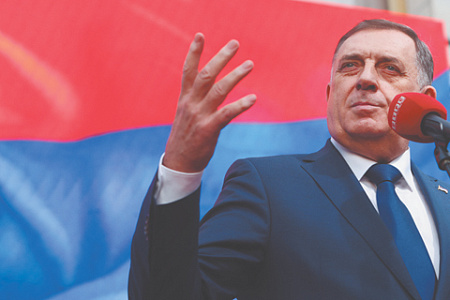
The political crisis in which Bosnia and Herzegovina (BiH), consisting of two de facto states (Republika Srpska and the Croatian-Bosnian Federation), has been in for a decade, risks having much more serious consequences than the paralysis of the system of state power. Attempts are being made to remove and arrest the President of Republika Srpska, Milorad Dodik. The BiH Prosecutor’s office issued a warrant for his arrest. As it seems now, it is technically impossible to fulfill it. However, this decision may bring the disintegration of the state closer.
Known for his pro-Russian views and promises to withdraw the Republika Srpska from BiH, Dodik has long caused discontent in Brussels, Sarajevo, and Washington. His relationship with the de facto head of state, the world community’s High Representative for Bosnia and Herzegovina, Christian Schmidt, has not worked out since he took office in 2021. Dodik does not recognize the legitimacy of this official, who was appointed, as the President of Republika Srpska pointed out, without the approval of the UN Security Council. And such a sanction was provided for by the Dayton Agreements, which put an end to the Bosnian War of 1992-1995 and, in fact, created BiH in its current form with the current unique state structure. This year, the conflict has entered a heated stage. In February, a BiH court sentenced Dodik to one year in prison and six years banned from government activities for disobeying Schmidt. But the sentence has not been fulfilled. All authorities of the Republika Srpska remain subordinate to Dodik, recognizing only him as their legitimate leader.
It was to be expected that the central authorities of BiH would take a new course. That’s what happened. The BiH Prosecutor’s Office has decided to arrest Dodik. The Investigation and Protection Agency (SIPA), the country’s main intelligence agency, must execute the warrant. The task assigned to him is hardly feasible. SIPA’s capabilities in Republika Srpska are extremely limited. The BiH Prosecutor’s Office has appealed to the law enforcement agencies of the Serbian part of the state with a request for assistance, but, of course, this request will not be granted.
Now the main question is what happens next. Yakov Smirnov, a researcher at the Department of Modern History of Central and Southeastern Europe at the Institute of Slavic Studies of the Russian Academy of Sciences, suggested in a comment to NG that Serbian President Aleksandar Vucic would stand up for Dodik in the near future, using all his connections at the EU level. The expert believes that Hungarian Prime Minister Viktor Orban may intercede for the Serbian president, who may be joined by Slovak Prime Minister Robert Fico. Both (especially Orban) have close ties to Vucic and Dodik.
Brussels may well agree to the mediation of these people. After all, EU peacekeepers are unlikely to be able to arrest Dodik quickly and without problems. The number of EUFOR (EU peacekeepers) in BiH is only one and a half thousand people. Some of them are Hungarians. Besides, as Smirnov noted, the peacekeepers do not have not only the capabilities, but also the authority to make an arrest of this kind.
At the same time, the expert is skeptical about suggestions that the arrest warrant for Dodik could trigger a resumption of armed conflict between Serbs, on the one hand, and Croats and Muslims, on the other. “In order for full-scale clashes to begin, there must be serious military forces on both sides. So far, neither side has full-fledged combat units. Serbia has them, but it will neither initiate hostilities nor even interfere in them,” Smirnov said.
In general, according to the expert, there will be no major changes in the short and medium term. Unless something unforeseen happens, Dodik will not lose his power or freedom. The BiH authorities will once again demonstrate their incapacity.
“But in the long run, the arrest warrant will, of course, add fuel to the fire of the old smoldering conflict. Most likely, Dodik will try to slowly but surely move the Republika Srpska towards independence with planned technical steps. He cannot do this abruptly and immediately, because this could cause a sharp reaction from the EU, and he would lose the support of Orban, Fico, and possibly Vucic. I think he will be successful in the long run,” Smirnov believes.
